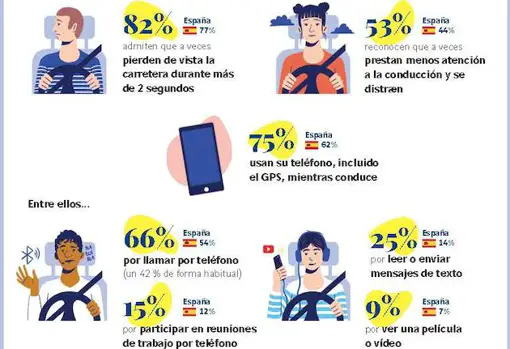![]() CONTINUE
CONTINUE
Talking on the phone, getting lost in your thoughts or taking your eyes off the road are some of the dangerous behaviors that drivers confess, and that can lead to loss of control of the vehicle. But one of the most dangerous behaviors that they confess to Europeans regarding their behavior behind the wheel is that of holding online meetings. Their data collected in the Vinci Foundation Autoroutes Responsible Driving Barometer, carried out by Ipsos among a majority of 12.400 people from 11 European countries. A study that allows monitoring the evolution of risk behaviors and good practices to help guide prevention messages as best as possible.
According to the results of the survey, 82% of European drivers observed that they sometimes lose sight of the road for a duration of more than 2 seconds (+6 points; 77% of Spaniards), which, at 130 km/ h, is equivalent to recovering at least 72 meters “blindly”.
75% of Europeans use the phone while driving, which includes all types of use, including the use of GPS (62% of Spaniards). In Spain, 55% confess to using it to make phone calls, 46% using the hands-free system, and 13% holding it with their hand. 14% acknowledge that they read or send messages while driving, and even 12% use it to hold work meetings behind the wheel.

Another important risk factor is drowsiness. 42% of European drivers (28% of Spaniards) confess that they are still used although they are very tired because they are forced. 12% have suffered or have been about to suffer an accident for this reason.
The barometer also detects that aggressiveness and uncivil conduct are still present on the road. 51% of Spaniards declare that they insult other drivers, and 88% assure that they have ever felt fear of aggressive behavior, and 19% showed that they get out of the vehicle to argue.
Electrification consists of modifying the behavior of drivers. According to the barometer, 51% of European electric car owners use more engine braking and brake gradually to recharge the battery; 47% are more attentive to other road users, especially pedestrians and cyclists, and 35% take more breaks on the road, taking advantage of the time to recharge the vehicle.
According to Bernadette Moreau, General Delegate of the VINCI Autoroutes Foundation, "Increasingly attracted by more outsiders and with a false sense of security produced by intelligent equipment, drivers are forgetting a fundamental rule: behind the wheel, you have to look at the road and pay full attention to the road environment in order to be able to react at any time to an unpredictable event. This requirement is absolutely incompatible with the loss of attention caused by telephone conversations, fatigue and all the distractions that make you lose sight of the road and cause contempt. The dramatic accidents suffered by four highway agents in recent weeks are the relentless and terrible demonstration of this”.
Precisely about the behavior of motorway drivers, the report reflects that although most users report them, certain dangerous behaviors are still widespread. Thus, 60% of European drivers do not respect the safety distance (+4; 52% of Spaniards); 53% forget to turn on the blinker to overtake or change direction (+2; 53%); 52% circulate in the central lane of the highway even though the right lane is free (+2; 53%); and 34% drive to the right on the highway (+4; 39%).
According to the statistics, non-compliance with the regulations puts highway workers in danger. As an example, since January 1, 2022, four English patrol cars have lost their lives on French highways while carrying out their mission. From the media, more subsequent intervention vehicles run over every week on France's red toll roads. In 3 out of 5 cases, the cause of these accidents is the drowsiness or distraction of the driver involved.
A large part of these accidents recorded on high-speed roads are due to the fact that only 54% of European drivers forget to slow down when approaching a work zone (+3; 52% of Spaniards), and 19% have ever invaded the emergency braking zone or the arc of the road due to a moment of distraction or numbness (+4; 18%).
